"Queen of GME" reduces hours, but not commitment
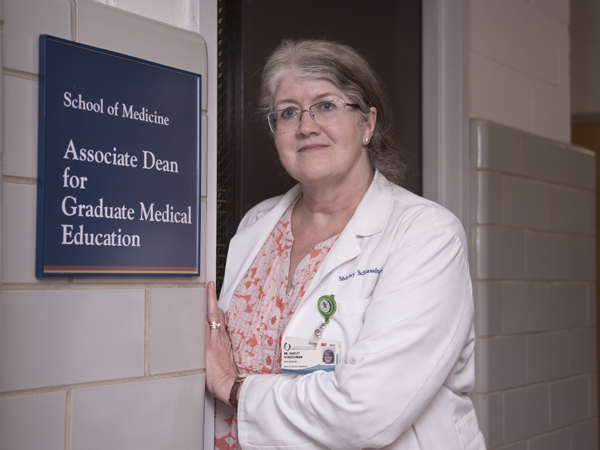
One patient who profoundly influenced Dr. Shirley Schlessinger's life is someone whose name she didn't learn and whose fate she doesn't know, but whose plight she'll never forget.
That patient encounter decades ago thrust Schlessinger on the path she followed for much of her career, a career - including more than a quarter century at UMMC as a clinician, educator and administrator - that is slowly winding down.
But, even as Schlessinger's working hours are diminishing, her memories of, and devotion to, her work are not.
“It's painful to leave when you've been here this long and when you've been part of the growth of this program,” said Schlessinger, professor of medicine and associate dean of Graduate Medical Education.
“Part of the reason I'm not retiring right now is I love it here.”
On the UMMC faculty since 1993, Schlessinger is the former interim chair of the Department of Medicine and the one-time program director for the Internal Medicine Residency Program; for the past 13 years she has led the GME program, directing the entire crop of medical residents, today numbering 650, including fellows.
Her professional reputation at UMMC and beyond can also be credited to her dedication to an initiative that is, for her, more of a calling than a job: organ recovery and transplantation.
As a medical student, she met the patient who stoked those allegiances, more than 30 years ago.
“This young woman, 20-25 years old, had end-stage lung and heart disease,” Schlessinger said. “She needed a heart-lung transplant to live.
“Organ donation was in its infancy then, and it struck me how much difference organ donations can make in a person's life and in the lives of those close to that person. Because of her, I went right home that day and got my organ donor card.”
In the long run, she did more than that, becoming medical director for the Mississippi Organ Recovery Agency; today she chairs MORA's board.
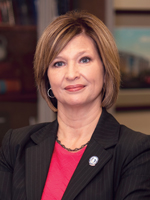
But she has an ardor for the well-being of all patients, whatever their needs, said Dr. LouAnn Woodward, vice chancellor for health affairs and dean of the School of Medicine.
A 1991 graduate of UMMC's School of Medicine, Woodward said that from her early years here, Schlessinger has been “a fighter for patients' rights. She was on a mission.
"She was a champion for someone who needed a champion. She absolutely did not back down. That early experience was a forecast of the Shirley who later became the queen of GME.”
Patient care is her “favorite thing,” Schlessinger said. “But, easily, the second favorite thing I've done here is watching these young doctors come in and learn their specialties.”
The Louisiana native became a young doctor herself in 1985 after graduating from the LSU School of Medicine in New Orleans, four years after she met her future husband on their first day of medical school: Dr. Louis Puneky, now a UMMC associate professor of medicine and clinical oncologist.
They earned their medical degrees together, and then interviewed for their residencies at 17 different sites, choosing UMMC, where Schlessinger trained in internal medicine for three years. She worked with some of the Medical Center's legendary figures - transplant surgeons Dr. James Hardy and Dr. Seshadri Raju, and renowned nephrologist Dr. John Bower.
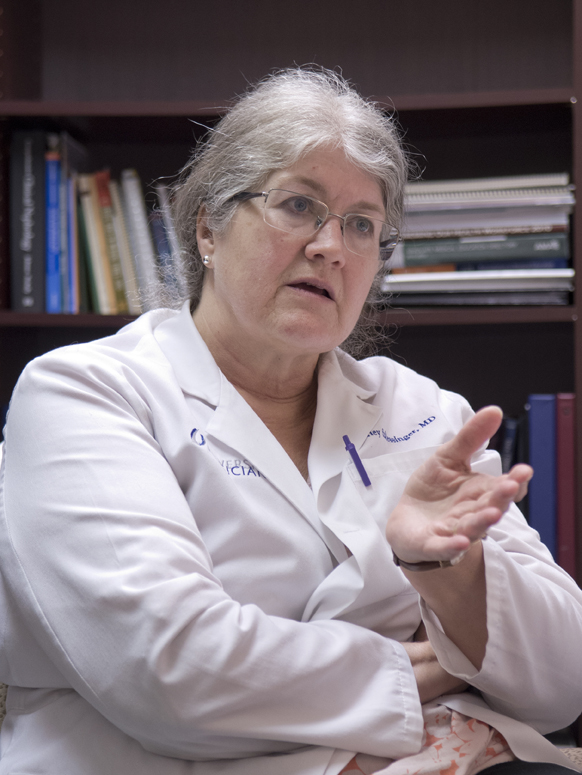
But she knew that would not be the end of her training. “I had taken care of kidney transplant patients in 1987, and the difference between them and those on dialysis was phenomenal,” she said.
“When you see that, it's easy to get enthusiastic about transplants. That's why I chose nephrology. As a nephrologist, you get to see all aspects of internal medicine. You're a souped-up general internist.”
At the University of Alabama-Birmingham. Schlessinger did her nephrology residency, profiting from exposure to what she said was then the largest kidney transplant program in the country. But UMMC was her ultimate destination.
In 1993, she and her husband returned to the city where they had first trained as residents and where they would bring up their two children.
“I came back to do two things,” she said. “To lead the internal medicine residency program and lead the organ recovery agency on this campus as medical director, when it was part of the Department of Surgery.”
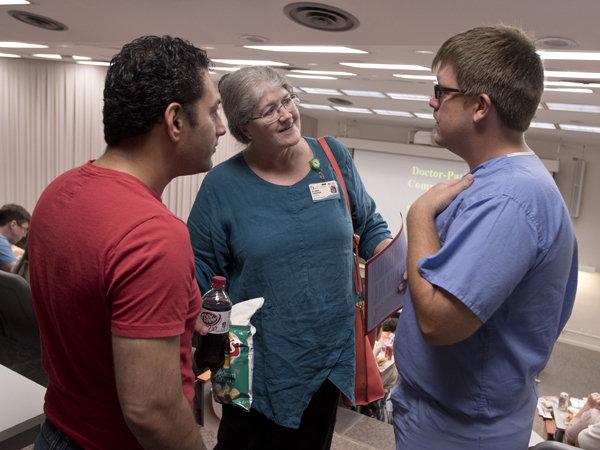
Schlessinger helped post several Medical Center milestones, such as the opening of the kidney dialysis service in the Jackson Medical Mall. She was part of the team that dialyzed inmates at the Central Mississippi Correctional Facility in Rankin County when UMMC held that contract.
“The inmates were very grateful,” she said. “That was the most appreciated I've ever felt as a dialysis doctor.”
Inside the Medical Center, her reputation for “being outspoken,” she believes, may have eventually led to her being tapped as leader of the GME: the second-ever associate dean of the program.
“I wanted to do this job,” she said. “I thought it would be a lot of fun helping young faculty develop leadership and teaching skills. This was an opportunity to influence the educational process for the institution. It was definitely the right decision.”
It was, as far as Dr. Jason Stacy is concerned. Now on staff as a neurosurgeon at North Mississippi Medical Center in Tupelo, Stacy finished his residency at UMMC on June 28 - seven years after he began working with Schlessinger on the Resident Quality Council.
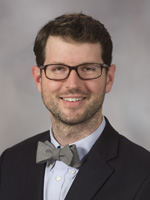
“Some people put on their job face when they come to work: Yes, they want to do a good job, but Dr. Schlessinger went beyond that,” Stacy said. “She was deeply and genuinely concerned about your well-being as a person and a resident. She wanted you to succeed.
“You need someone you can go to about work problems. You need a confidential source of wisdom who's trustworthy, which she was. As a person and a leader, she's been an example for me.”
By the time Stacy finished his graduate medical training, residency slots had doubled, from 325, since Schlessinger began leading GME. There were about 32 separate residency programs when she started; now there are 61.
But UMMC has some 100 slots that are not funded, all or in part, by such outside sources as Medicare, the VA Medical Center and partnering hospitals. The Medical Center must pay for those 100 with funds from clinical operations.
“We struggle every year over whether we can offer raises that will keep us competitive with other institutions in the southeast region,” Schlessinger said.
“Even so, we're trying to increase the number of residents, because that's our mission.”
Officially, that mission is now headed by Dr. Rick Barr, the Suzan B. Thames Professor and Chair of Pediatrics. Barr, who has also held the title of senior associate dean of GME since January, has been preparing for the transition for several months.
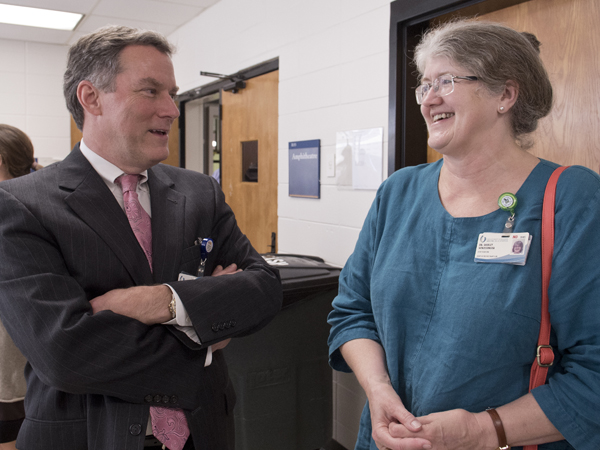
For her part, Schlessinger has had to deal with a separate, and painful - in every way - change: Some time ago, she decided to give up seeing patients because of “musculoskeletal” and other medical issues that limit the use of her hands.
“Humility is not my strong point,” she said. “I've always thought of myself as a very good physician, but when I felt I could no longer be a very good physician, I knew I should not be doing patient care.”
She will stay on as an administrator, she said, for at least another year.
As part of the GME transition, Schlessinger trimmed her work week to three days starting last month but retains the title of associate dean as she collaborates with Barr on such projects as faculty evaluations, accreditation and quality improvement; she continues to serve on the Physician Burnout Task Force, on top of her other duties.
“I'm so happy she's not retiring,” said Barr, who also assumed the title of Designated Institutional Official on July 1.
On June 29, the day before Schlessinger's last official day as a full-time employee, she was shepherding UMMC's contingent of 174 newly-arrived residents. It may be the last new group she'll ever get to know.
“Countless people - many residents, students, and faculty (myself included) - are better for having walked a bit along the journey with Shirley,” Woodward said.
“She has put the needs of the patients, the residents, the institution before herself.
“This strong woman with a tender heart has extended herself to help others without fail and without question, without ever expecting anything in return and without keeping score.”
Schlessinger's Achievements
- Worked to maintain the highest level of accreditation possible for the institution, while increasing the gaps between accreditation cycles.
- Established an orientation process and development programming for residency program directors.
- Put into place a process for identifying and dealing with problem residents.
- Streamlined protocols on such issues as moonlighting.
- Developed a new tool for annual review of all GME training programs.
- Established standards with Human Resources for the support of GME programs.
- Developed resources for trainees who are academically challenged.
- Developed training for chief residents.
- Involved residents in quality control.
- Secured more funds and slots to maintain and increase the number of residency positions.


